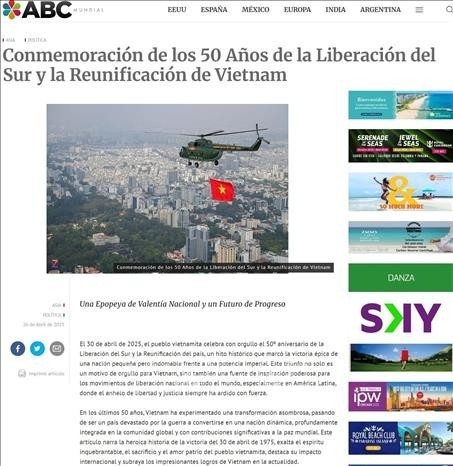The articles emphasize that the victory on April 30, 1975, when the tanks of the liberation military entered the Independence Palace, not only ended a protracted war but also became an everlasting symbol of the will for independence and freedom. This victory was not only a source of pride for Vietnam but also became a powerful inspiration for liberation movements around the world, especially in Latin America, where the desire for freedom and justice was always burning.
    |
 |
|
Story about Vietnam's 50th anniversary of the Liberation of the South and National Reunification on ABC Mundial. |
Ámbito Internacional and ABC Mundial dedicate many pages to analyzing the historic Ho Chi Minh Campaign, the leadership role of the Communist Party of Vietnam and President Ho Chi Minh, along with the spirit of sacrificing everything to not lose the country, to not be enslaved of the people from both the North and the South of Vietnam.
In particular, the touching articles recall the great sacrifices of over 1.1 million martyrs, particularly young fallen combatants like Vo Thi Sau, Nguyen Van Troi, ten female youth volunteers at Dong Loc junction, and millions of wounded soldiers and families. The blood and bones of the Vietnamese people wrote the epic of the century, the news outlets commented.
The reports highlight that the victory of Vietnam became driving force for liberation movements in Latin America, Africa, and Asia. Citing a statement from Cuban leader Fidel Castro: “For Vietnam, Cuba is ready to devote its blood,” the article affirms the special solidarity between Vietnam and its friends.
Ámbito Internacional asserts that the victory on April 30, 1975 is not only the achievement of the Vietnamese people but also results of the support of international friends. Socialist countries such as the Soviet Union, China, and Cuba provided Vietnam with valuable military and economic assistance. The anti-war movements in the U.S. and Asia also contributed to creating pressure that forced Washington to end the war.
This news outlet devotes much of its content to analyzing Vietnam’s impressive socio-economic development achievements. Since the Doi moi (Renewal) policy was implemented in 1986, Vietnam has achieved an impressive economic growth rate of 6.5-7% per year, with the gross domestic product (GDP) reaching about USD 470 billion in 2024.
Free trade agreements like the Comprehensive and Progressive Agreement for Trans-Pacific Partnership (CPTPP) and the E.U.-Vietnam Free Trade Agreement (EVFTA) have made Vietnam an attractive destination for multinational corporations. In social fields, the country’s poverty rate decreased from 70% in the 1970s to below 4% in 2024. Education and healthcare have made remarkable progress, with a literacy rate of 98% and an average life expectancy of 76 years. Vietnam is an active member of the Association of Southeast Asian Nations (ASEAN), the Asia-Pacific Economic Cooperation (APEC) forum, and is a member of the U.N. Human Rights Council for the 2023-2025 term.
Meanwhile, ABC Mundial praises the policy of completely waiving tuition fees starting in the 2025-2026 school year and the roadmap toward free healthcare, viewing this as a “rare humanitarian advancement.”
The Spanish-language news outlet cites a statement from Party General Secretary To Lam: “Vietnam is strongly restructuring its state apparatus, attracting record numbers of investors and international leaders.” It notes that with the goal of becoming a high-income developed country by 2045, Vietnam is on a path of sustainable growth, particularly in high technology and tourism.
The Latin American media affirms that the victory on April 30 leaves valuable lessons about the strength of national solidarity and the spirit of self-reliance. For Latin America, where countries frequently face external interference, this lesson is particularly meaningful. Fifty years after reunification, Vietnam, once a war-torn nation, has risen strongly, becoming a model of national revival and an inspiration for the world about the desire for peace, independence, and self-reliance.
Source: VNA